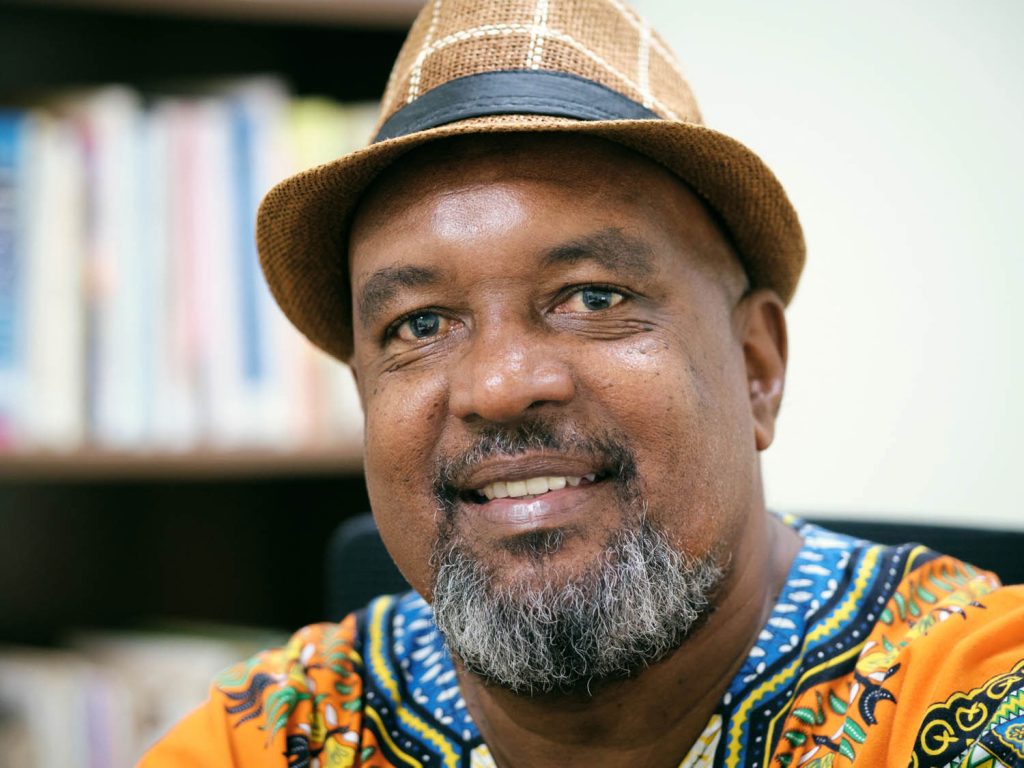“Idi kwik!” says the storyteller.
(Then you, the reader, must take on the responsibility of being the audience. You respond, “kwak”.)
And so, the story can begin.
The written word is not the traditional format for this type of Caribbean storytelling, but here we must make do. Kwik-kwak, as it is known in French Creole (or crick-crack in the anglicised form), is a call and response that establishes the agreement between the storyteller and their audience to actively participate in the sharing of some piece of oral history.
This is a tradition that came across to the Caribbean from the griots of West Africa, who had the vital role of passing down shared knowledge and culture through poetry, song, jokes, and stories. Nowadays, it is not as widespread as it used to be, but there are still pockets all across the region where this type of communal tradition can be found.
Dr Raymond Travis Weekes is one of the creative minds attempting to preserve and share this type of cultural heritage for a new generation. Dr Weekes is a child of the theatre — he grew up in St Lucia watching the work of his father Alan Weekes and the rest of the St Lucia Arts Guild, including twin brothers Roderick and Derek Walcott.
The more we learn about our cultural history and identity, the more we are empowered to reimagine what a Caribbean future can look like
Even when Derek (a Nobel laureate) left — first to study in Jamaica and then to settle in Trinidad — the Walcott brothers’ writing was instrumental to the theatre space of St Lucia and to Weekes’ upbringing.
“They were really thinking of the development of a Caribbean theatre aesthetic … the kind of theatre that would reflect the Caribbean language and culture and concerns as different from the inherited theatre from the West — the European theatre brought by the colonisers,” he says.
For the Walcott brothers and their cohorts, there was a preoccupation with reflecting back to us the cultural forms and rituals that our ancestors had brought with them from across the world, and that had morphed over time into something truly Caribbean.
In our postcolonial space, we bear the trauma of having much of our history and culture stripped away and replaced by the Eurocentric ideal of what art and music and theatre should look like. But reconnecting to these rituals can be a healing process.
It is this legacy that Weekes has hoped to continue in his work, which took him to the Jamaica School of Drama, into a degree in the arts at The University of the West Indies (UWI) Mona, back to St Lucia to their Folk Research Centre, across to Barbados for postgraduate studies in Creole traditions, and now to his base in Trinidad & Tobago at the Department of Creative & Festival Arts at The UWI St Augustine campus.
But long before his university studies, his childhood excursions — through his father’s work in the theatre — had taken Dr Weekes all across the Caribbean. The elder Weekes was translating some of Walcott’s plays into Kwéyòl (St Lucian Creole), and his son accompanied him to Martinique and Guadeloupe, where they were staged.
The younger Weekes has continued on this mission with his own work, like his play A Fight For Belle Vue, which incorporates Kwéyòl, drumming, folk singing and dancing, and the character of the Konté (the traditional St Lucian name for the lead singer or storyteller).
It is not only a means of preserving these traditions — but of exploring and transforming them
Weekes recently directed a production of Sunday with the Warlord, a play on calypsonian Lord Blakie written by Dawad Philip that explores the idea of celebrating our cultural traditions and heritage.
I visited a rehearsal a few days before opening night. Like any theatre production in the final moments of preparation, the energy was tense, and everyone was deeply focused on getting the finishing touches right. But Weekes is relaxed, and as an actor flubs a line and apologises to him, he simply laughs warmly.
A few nights later, with the audience packed into Queen’s Hall, the play is transformed by the one element missing from the rehearsal — the audience. It’s something he talks about often in his work. “The transfer of music from the oral tradition to the stage utilises the call and response structure typical of Caribbean folk songs, that invites audience interaction,” he explains.
Bringing to the stage and the page these elements of our culture is Weekes’ way of celebrating the magic and resilience of Caribbean people. “The literary artists and the fine artists — those in the arts in the Caribbean — are really standing on the shoulders of the ordinary folk … who have not allowed the process of colonisation to take them over completely,” he says.
His stories tell of the trials of working-class people, who also act as the guardians of our cultural traditions. They speak the language that evolved here, and tell stories that were passed down through generations. It is not only a means of preserving these traditions — but of exploring and transforming them.
For Weekes, Creole theatre is a way to utilise these cultural forms to “create spaces for catharsis”, as he puts it. It is a form of what he calls “psychological liberation”, to embrace, celebrate and put to use these elements of our culture for healing the collective trauma of our colonial past.
Through his teaching work and his own writing, Dr Weekes has dedicated much of his life to bringing Kwéyòl to the theatre and rekindling our collective relationship to these types of artforms. As he notes in his book, “representation is power”— and the more we learn about our cultural history and identity, the more we are empowered to reimagine what a Caribbean future can look like.

